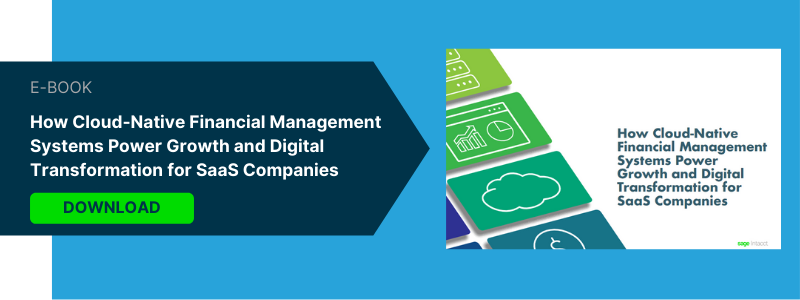Unlocking Digital Transformation in SaaS Organizations
SaaS companies are benefiting from digital transformation initiatives as catalysts to improve business performance, achieve scale and continually innovate to grow. More than most, finance leaders at these companies know the value of cloud-native platforms as both a supplier and consumer.
Cloud-native financial management systems are business technologies that help companies and organizations manage their cash flow, assets and investments to support business planning and decision making. These platforms capture transactional data, automate business processes and streamline reporting so business leaders can make real-time data-driven decisions for greater business agility.
SaaS companies decelerate their digital transformation journey using spreadsheets or simple bookkeeping software such as QuickBooks. That’s why it’s important to understand how cloud-native financial management systems are related to digital transformation. These platforms play a critical role in driving business growth and help SaaS companies take steps toward implementing more digital solutions.
How Cloud-Native Financial Management Systems Drive Digital Transformation
SaaS companies need cloud-native financial management system capabilities to automate their operations. Unless a company can digitally exchange data with other businesses, it doesn’t have the functionality to adopt digital transformation in other areas of the business. When SaaS companies do away with manual and traditional-based processes, they unlock more potential across the organization.
Digital transformation impacts all areas of a business from interactions with customers and partners to how employees function. Digital transformation vastly reduces friction across all parts of an organization. A company can be in a better position to manage cash flow, budgets, accounts payable, accounts receivables, days sales outstanding and order metrics while lowering operating expenses.
A recent study, conducted by Deloitte, found that organizations with mature digital transformation initiatives have better financial performance than others. Deloitte reported “higher-maturity organizations surveyed were far more likely than lower-maturity ones to significantly outperform their industry average on key financial metrics. Furthermore, “digital maturity’s impact on financial performance comes from enabling improvements in efficiency, revenue growth, product/service quality, customer satisfaction, and employee engagement—as well as by prompting a greater focus on growth and innovation.” Forty-five percent of organizations with higher digital maturity reported net revenue growth as compared with 15% of those with lower digital transformation maturation, and 43% reported higher net profit margins, again as compared with 15% of those with lower digital transformation maturation.
Among the strategic challenges that SaaS companies face are improving business performance, achieving scale, and driving innovation and growth. These companies can use modern, cloud-native platforms to meet these tests in areas that include:
- Creating frictionless billing across multiple revenue types, including subscriptions, SaaS, perpetual licensing, channel revenue and professional services
- End-to-end revenue recognition to achieve ASC 606/IFRS 15 compliance
- Integration to automate accounts payables, consolidations, expenses, reconciliations and consolidations
- Understanding trends, identifying issues and finding opportunities with real-time reporting and forecasting while providing predictability to stakeholders
- Scaling with multitenancy, elastic infrastructure, high configurability, self-service expansion and integration APIs
- Achieving organizational agility with an open and configurable true-cloud solution that reduces dependencies on scarce IT resources
As a business grows, it’s critical to invest in innovative technology that offers a seamless flow of business information with customers and trading partners. SaaS finance teams need to create frictionless billing, comprehensive reporting, and deferred revenue from start-up to IPO. Automating key processes of prospect-to-disclosure and procure-to-pay to produce data for decision making is paramount to winning in SaaS markets.
A cloud-native financial management system thrusts a business forward so you can stay ahead. It helps unlock the ability to adopt digital transformation across the organization. Modern data exchange also helps increase revenue and optimizes the business’s capabilities. Deploying a cloud-native financial management system prepares a business for the future by giving the finance team more control and visibility into the operations, and the ability to meet new demands.
For more information on how SaaS companies are using cloud-native financial management systems to drive digital transformation, check out our eBook How Cloud-Native Financial Management Systems Power Growth and Digital Transformation for SaaS Companies.





